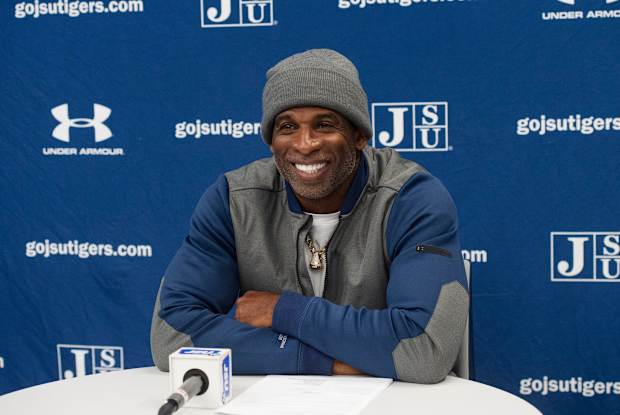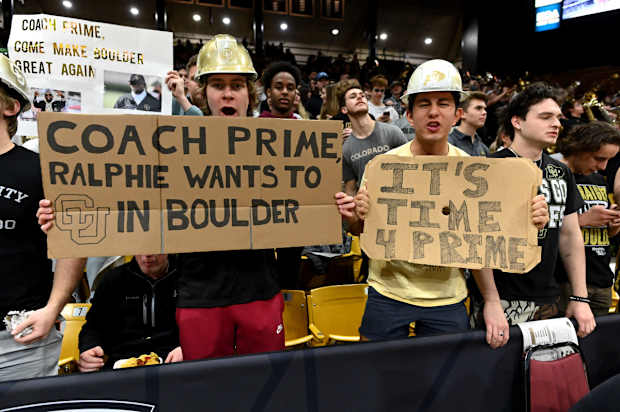If Deion Sanders succeeds at Colorado, a lot of other schools are going to have some explaining to do. They will need to explain why they passed on a coach with a 27–5 record, who has won 21 of his past 22 games, and pulled off arguably the biggest recruiting coup in history. They’ll have to explain why they didn’t want the automatic boost of exposure, charisma and verve.
Maybe it doesn’t work—he is taking over the worst Power 5 program in the country, after all, which has one winning season in the past 17. But it’s a worthwhile gamble for athletic director Rick George, a boom-or-bust swing with sky’s-the-limit upside. And it stands out in sharp relief to all the programs that kept finding reasons not to hire Sanders.
The caveats, questions, concerns and rationalizations have been piling up for weeks around Coach Prime as an FBS coaching candidate. The more he has won at Jackson State, which improved to 12–0 on Saturday and won the SWAC championship in a rout, the more murmurs there have been about why he would be a risky hire at a bigger school.

Barbara Gauntt/Clarion Ledger/USA TODAY Network
It’s been quite a study.
Hard to manage.
Diva.
Celebrity coach.
No FBS experience.
- Meanwhile, Hugh Freeze was hired at Auburn. Did he prove hard to manage at Mississippi? Only if being steeped in multiple scandals is a management issue. But now he has received a second chance in the Southeastern Conference.
- Lane Kiffin got a raise and extension at Mississippi. Could Kiffin be considered a diva? Only if engaging in a Twitter war with a local TV reporter the week of his biggest rivalry game is a sign of unchecked vanity. But Lane turned down Auburn and remains in demand.
- Trent Dilfer was hired at UAB out of a high school in Nashville, having never coached at any other level. Could the Super Bowl-winning quarterback and longtime ESPN analyst be considered a celebrity coach?
- Biff Poggi was tabbed to be the next coach at Charlotte, which is upgrading to the American Athletic Conference. He was an investment manager-turned-high school coach-turned Jim Harbaugh’s muse at Michigan for the past couple of seasons.
What’s the difference between Sanders and those coaches? Anything obvious at first sight? Anything at all? Hmm?!
They are the kind of hiring situations that leave candidates of color shaking their heads, with the overall number of Black head coaches still at unacceptably low levels in college football. White coaches get more second chances—they are more often the unconventional hire, and certainly don’t face the level of “Well, but” drawbacks that helped send Sanders out West for his FBS Power 5 break.
Sanders, 55, assuredly could have landed those jobs at Charlotte or UAB if he wanted them. But the SEC, which currently has no Black head coaches among its 14 members or two future members, still hasn’t shown serious interest in a coach who has made an impact all over its footprint. Sanders is a Florida native who went to Florida State, was a two-sport professional star in Atlanta with the Braves and Falcons, later a football star in Texas with the Cowboys, an instant coaching success in Mississippi with Jackson State and a recruiting force throughout the South. (His signing of No. 1 2022 national recruit Travis Hunter out of Georgia sent shockwaves throughout the sport.)
Ideally, athletic directors and university presidents want coaches who are low-maintenance team players, but what they really want are winners. History is full of coaches with difficult personalities who were tolerated—even celebrated—because they won games.
A celebrity coach with no FBS experience who could be a diva and difficult to manage with no real interest in the Normal Way of Doing Things, who also is Black, seems to be a scary prospect for some schools. Perhaps SEC and Atlantic Coast Conference schools will let Sanders prove his Power 5 chops at Colorado and then think they can swoop in after a couple of years.
If there is one legitimate cause for concern from university presidents when it comes to Sanders, it’s having his name attached to the doomed Prime Prep Academy in the Dallas-Fort Worth Metroplex. The group of schools came under scrutiny for academic issues, athletic recruiting, fraud, influence peddling and other problems. But Colorado certainly isn’t hiring Sanders to run the place, just coach the football team.

Ron Chenoy/USA TODAY Sports
So give the Buffaloes credit for daring to go where others would not. Is Sanders a natural fit in Colorado? Does it really matter? He will immediately have the attention of the top recruits in the state, most of which come from the nearby Denver area. And he will almost assuredly bring the best of his stockpile of players from Jackson State, starting with two-way player Hunter and Deion’s quarterback son, Shedeur.
When Colorado had its best run, in the late 1980s and early ‘90s, it brought in game-changing recruits from areas as diverse as Los Angeles, Houston and New Orleans. Sanders could, in theory, replicate that kind of national recruiting reach. He will certainly get the program into more living rooms than any Buffaloes coach since 2005, when they fired their last successful coach, Gary Barnett.
A school notoriously short on big-money booster support, Colorado is making a full commitment for Sanders. His compensation should immediately be among the highest in the Pac-12, with a staff salary pool to match. Perhaps, more importantly, the school reportedly is working to restructure some of its transfer requirements to make it easier to bring in players via the transfer portal. If the NIL/collective piece also comes together, Colorado will have performed a sweeping upgrade coming off a 1–11 disaster of a season.
As with any coaching hire, there is no guarantee of success. If there were, schools wouldn’t be in the business of firing coaches every few years. But this is an absolutely worthwhile adventure for Colorado to embark upon.
And if it works, it will be an embarrassing scenario for schools that found reasons not to hire Deion Sanders.







